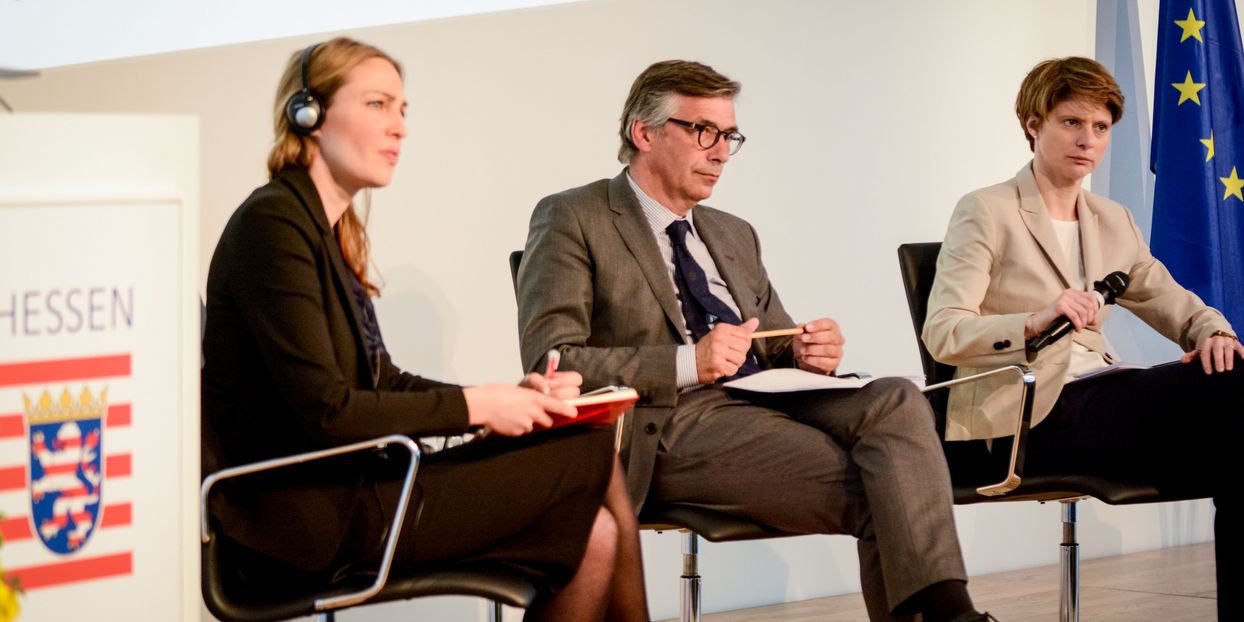
Die Krise der Nichtverbreitung - Zur Erneuerung der nuklearen Ordnung
Crisis Talk on 15 May 2019
The topic of the 11th Crisis Talk was a crisis that had disappeared from public discourse for a long time. The threat of nuclear weapons seemed to have become obsolete after the end of the Cold War. The network of bilateral and multilateral treaties and institutions designed to curb proliferation and prevent the use of nuclear weapons was long considered stable. But the stability of this nuclear order is anything but guaranteed. There are increasing signs of a crisis in this order. Alexander Lorz, the Minister of Education and Cultural Affairs of the State of Hesse, pointed out in his welcoming address that this topic is "burningly topical" and is not sufficiently perceived by the public.
A central point of discussion was the responsibility of Europe in this crisis. According to Christopher Daase, the problem is above all that the EU member states are not in agreement on the nuclear weapons problem and therefore cannot speak with one voice. This point was also taken up in the questions of the audience. Europe should actually be expected to stabilize the existing order, such a demand, but this is by no means the case. Elizabeth Konstantinova could not fundamentally contradict this, but she tried to take a more differentiated view by pointing out the many small successes that were certainly achieved within the framework of the European institutions.
Christopher Daase (Peace Research Institute Frankfurt) gave the crisis more precise contours in his keynote speech: "The bilateral arms control agreements concluded during the Cold War and shortly thereafter are being terminated or are expiring without any prospect of renewal. The multilateral treaties on nuclear non-proliferation or ending nuclear test explosions are in crisis or will not be ratified. This threatens to render restrictions on nuclear armament, transparency and verification agreements null and void and to make way for a new arms dynamic". The presentation, which highlighted the explosiveness of the topic but also showed options for action, was followed as always by a moderated discussion. Tytti Erästö (Stockholm International Peace Research Institute) and Elizabeth Konstantinova (European External Action Service), representatives from academia and practice, were invited to participate in the panel.
With regard to the fundamental question of what to do in the face of the crisis of the nuclear order, Tytti Erästö decided that it is much better to repair the existing order than to try to create a new one. Christopher Daase finally argued in the same direction. For example, the EU must develop a united position on the Nuclear Non-Proliferation Treaty and not pretend it does not exist. This treaty, which aims to achieve a world without nuclear weapons, was concluded against the will of the nuclear weapon states and has led to a division not only of the European states. This division had to be overcome: "Instead of giving in to pressure from the USA (and NATO) and considering the Nuclear Non-Proliferation Treaty as incompatible with the Non-Proliferation Treaty, the states should look for common ground and build bridges between the member states," said Christopher Daase.
Overall, this Crisis Talk ended on a more reflective note than an optimistic one. This was also shown by the many questions from the audience, which were characterised by a high level of expertise and also critical interventions and appeals. The cooperation partners of the Representation of the State of Hesse, the European Office of the Leibniz Association, the Cluster of Excellence Normative Orders and the Leibniz Research Alliance "Crises of a Globalized World", which jointly organize the Crisis Talks, thus once again offered a framework for an informed exchange between science and practice, which in the best sense corresponds to the form of a dialogue and from which both sides benefit with new insights.
